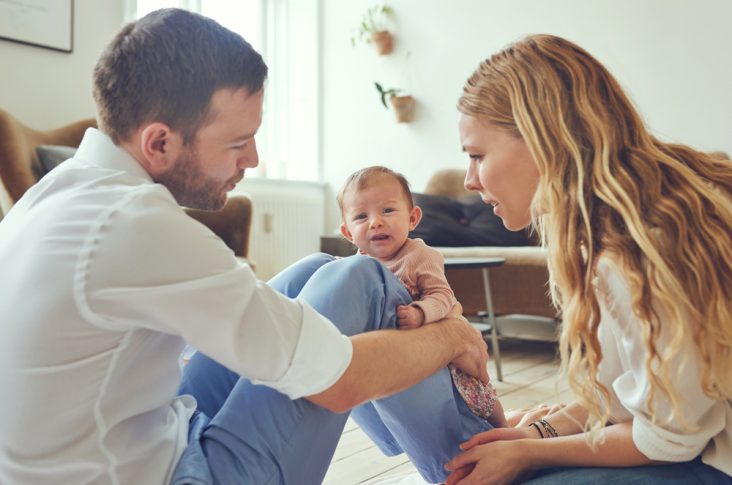Is it possible for babies to contract COVID-19? What are some of the most common signs and symptoms? We’ve compiled a list of the most frequently asked questions about keeping infants healthy during a pandemic.
After a year, scientists have learned a lot about the coronavirus pandemic, which has affected millions of people in the United States. Parents can breathe a sigh of relief knowing that COVID-19 largely spares young children, but it turns out that babies might not have the same level of protection.
According to the Centers for Disease Control and Prevention (CDC), “babies under 1 year old might be more likely than older children to have serious illness from COVID-19.” Their immune system is still evolving, and their airways are narrower.
Although there hasn’t been much research on the topic, a World Health Organization (WHO)-China Joint Mission study on the coronavirus, which was released in mid-February 2020, sheds some light on infants’ vulnerability. The study looked at 2,143 pediatric patients and found that the proportion of serious and critical cases was 10.6% for babies under one year old and 7.3 percent for children aged one to five years old, compared to 3% for 15- to 18-year-olds.
The CDC issued a study in April 2020 that backs up these statements. Around 2,500 COVID-19 cases in children aged 18 and under were examined by researchers. They discovered that children had milder effects than adults, but that babies did not do as well. In the report, 59 (62%) of the 95 babies were admitted to the hospital. Five of the babies were taken to the intensive care unit. In contrast, only about 14% of children aged one to seventeen were admitted to the hospital.
Before you worry, keep in mind that the majority of COVID-19 cases in infants in the United States are mild—and many of them have asymptomatic presentations with no symptoms at all. Furthermore, recent studies and evidence indicate that the majority of babies recover without any long-term complications or side effects.
We’ve put together a guide to COVID-19 in babies and newborns to help you stay updated and keep your family safe. Continue reading to learn more about the symptoms of the coronavirus, as well as preventive strategies.
Symptoms of COVID-19 in Infants
According to the CDC, children under the age of one are more likely than older children to contract a serious coronavirus infection. Despite this, the majority of children in the United States have asymptomatic or moderate cases.
Baby COVID-19 symptoms might include:
Fever
Cough
Runny nose
Vomiting
Diarrhea
Breathing difficulties or rapid breathing
Decreased feeding
Lethargy
Sore throat
Changes in behavior
These symptoms normally appear two to fourteen days after being exposed to the virus. Babies with symptomatic COVID-19 normally improve within two weeks, but if they have any complications, the recovery time can be extended.
Complications of COVID-19 in Infants
It’s impossible to predict how your child will respond to the coronavirus. They may be asymptomatic, develop mild symptoms similar to a common cold, or develop serious complications that include hospitalization or death (although this is rare).
“Neonates with underlying medical conditions, as well as preterm infants (less than 37 weeks gestational age), may be at higher risk of serious illness from COVID-19,” according to the CDC. Congenital heart disease, genetic, neurologic, and metabolic disorders, among other things, may be present.
Respiratory failure, organ failure, heart failure, shock, hypoxia, and other COVID-19 complications have been observed in older children. Although these complications are uncommon, you should notify your doctor as soon as possible if you are concerned.
COVID-19 in Babies with No Symptoms
Many babies have been found to be asymptomatic carriers of COVID-19 based on testing and studies. Although asymptomatic presentation is reassuring for parents, it also raises the possibility that babies can unknowingly spread the coronavirus to their caregivers.
Consider the case of a 6-month-old baby in Singapore, which was written in the journal Clinical Infectious Diseases. According to the Los Angeles Times, after a mother and nanny were admitted to the hospital with pneumonia and the father developed a fever and sore throat, hospital workers discovered the baby had elevated levels of the coronavirus in his “throat, blood, and stool.” Since the baby was asymptomatic, the coronavirus spread quickly among the caregivers. During a subsequent hospital stay, he showed no signs or symptoms (with the exception of a very short-lived fever).
These “silent cases” could aid in the spread of the coronavirus, which is especially concerning for grandparents and caregivers with weakened immune systems.
What Do I Do If My Baby Has COVID-19 Symptoms?
The COVID-19 infection protocol varies depending on the case. Some newborns, for example, are exposed during or after childbirth. There’s also mounting evidence that babies can contract COVID-19 via the placenta while still in the womb, though this tends to be an uncommon occurrence. The CDC recommends monitoring “regardless of whether there are symptoms of infection in the neonate” if Mom suspects or confirms COVID-19 after childbirth. Testing should begin at the age of 24 hours, and if the results are negative, it should be repeated at the age of 48 hours. Furthermore, if a mother’s COVID test is positive, the newborn should be considered to be positive as well.



